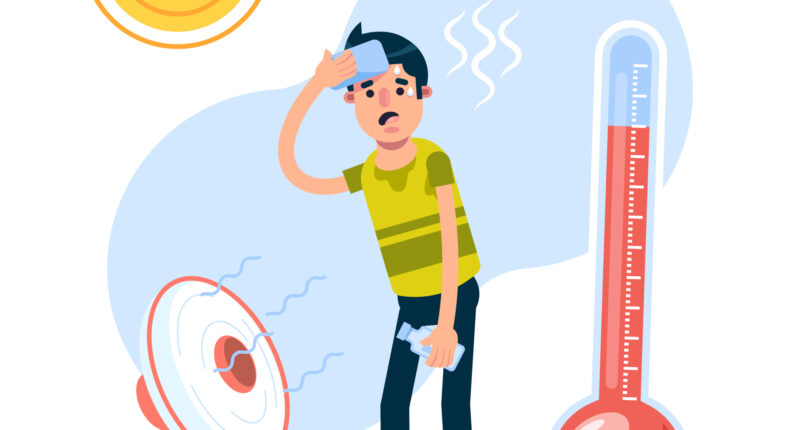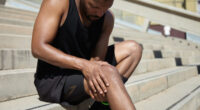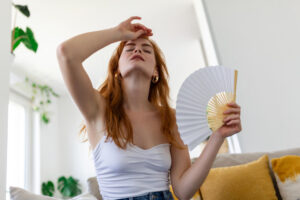Heat exhaustion is a heat-related illness that can occur after exposure to high temperatures, particularly when combined with high humidity and strenuous physical activity. It is a severe condition that can lead to heat stroke, a life-threatening condition, if not addressed promptly. This blog will explore the symptoms, causes, and prevention methods for heat exhaustion to help you stay safe during hot weather.
Symptoms of Heat Exhaustion
Recognizing the signs of heat exhaustion is crucial for early intervention. Common symptoms include:
- Heavy Sweating: Excessive sweating is one of the body’s primary ways to cool down, but it can lead to dehydration.
- Weakness: Feeling unusually weak or tired is a common symptom.
- Cold, Pale, and Clammy Skin: Excessive sweating can cause the skin to feel relaxed and clammy even in hot weather.
- Fast, Weak Pulse: The heart rate can increase as the body tries to cool down.
- Nausea or Vomiting: Stomach discomfort or vomiting can occur.
- Muscle Cramps: Painful cramps, particularly in the legs and abdomen, are common.
- Dizziness or Fainting: Feeling lightheaded or fainting is a sign that the body is struggling to cool itself.
- Headache: A persistent headache can occur as the body’s temperature regulation fails.
Causes of Heat Exhaustion
When the body can’t cool down properly, it could be a sign of heat exhaustion. This can lead to a rise in core temperature. The main causes include:
- High Temperatures: Prolonged exposure to hot environments, especially during heatwaves, can overwhelm the body’s cooling mechanisms.
- High Humidity: Humidity reduces the effectiveness of sweating, making it harder for the body to cool down.
- Strenuous Activity: Engaging in intense physical activity in hot conditions increases the risk of heat exhaustion.
- Dehydration: Not drinking enough fluids reduces the body’s ability to sweat and maintain an optimal temperature.
- Clothing: Wearing heavy or non-breathable clothing can trap heat and impede sweat evaporation.
Prevention of Heat Exhaustion
Stay calm and hydrated to beat the heat and avoid exhaustion. Here are some effective strategies:
- Stay Hydrated: Drink lots of water before, during, and after outdoor activities. Your body will thank you! Avoid alcohol and caffeine, as they can lead to dehydration.
- Take Breaks: When engaging in physical activities, take frequent breaks in a shaded or cool area to allow your body to cool down.
- Wear Appropriate Clothing: Choose lightweight, loose-fitting, and light-colored clothing to help sweat evaporate and reflect heat.
- Use Sunscreen: Protect your skin from sunburn, affecting your body’s cooling ability.
- Avoid Peak Heat Hours: Try to schedule outdoor activities for the more excellent parts of the day, such as early morning or late evening.
- Acclimate to the Heat: “Get acclimated to higher temperatures by gradually increasing your exposure over a few days. Your body will thank you for taking it slow.
- Use Fans and Air Conditioning: Utilize fans or air conditioning to keep indoor environments cool.
What to Do If You Suspect Heat Exhaustion
If you or someone else shows signs of heat exhaustion, it is essential to act quickly:
- Move to a Cooler Place: Find a shaded or air-conditioned area.
- Rest: Lie down and elevate the legs slightly to promote blood flow.
- Hydrate: Hydrate by drinking water or sports drinks to replace lost fluids and electrolytes.
- Cool the Body: Use cool, wet clothes, shower, or spray with water.
- Monitor Symptoms: If you notice that your symptoms are worsening or don’t start feeling better within an hour, it’s essential to seek medical help immediately.
Conclusion
Heat exhaustion is preventable and has profound health implications if not addressed promptly. By understanding the symptoms, causes, and preventive measures, you can protect yourself and others from the dangers of excessive heat. Stay vigilant during hot weather, stay hydrated, and take proactive steps to keep cool. Your health and well-being depend on it.










